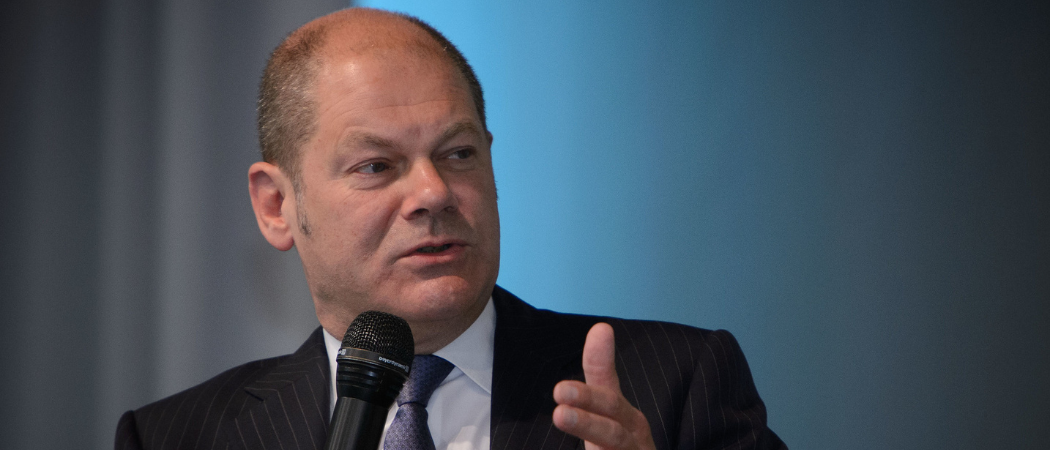European entrepreneurs are being lured to the US by huge private investment, the German chancellor told research leaders

German chancellor Olaf Scholz. Photo credits: Heinrich-Böll-Stiftung / Flickr
German chancellor Olaf Scholz has thrown his weight behind an EU capital markets union to close the bloc’s innovation gap with the US by allowing far more private funding to flow into European start-ups.
Speaking at Germany’s annual science and innovation summit yesterday in Hannover, Scholz said he is frustrated by stories of German entrepreneurs given a few million euros of public research funds in Europe, but ultimately tempted away to the US by hundreds of millions in private investment.
“We of course need a genuine European capital market,” he said. “This has been debated for years. [French president] Emmanuel Macron and I have resolved to finally get our act together […] so that Europe can keep pace with the USA and China.”
France is also now giving the capital markets union, mooted a decade ago, a fresh push. Proponents say it would allow investment to better flow across borders and into European start-ups, rather than across the Atlantic to the US, reducing EU companies’ reliance on bank debt.
Venture capital investment is ten times bigger in the US as the EU as a proportion of GDP, according to the European Council. Earlier this week, Commission president Ursula von der Leyen estimated a completed capital markets union would attract an extra €470 billion a year in private finance.
Significantly for science organisations, the capital markets union – rather than an increase in basic research funding, say – is coming to be seen in some EU capitals as one of the chief ways the EU can catch the US in building successful, innovative companies.
Earlier this month, Eurozone finance ministers acknowledged that the lack of risk-taking finance forced “many of the EU’s most dynamic and innovative businesses to seek funding abroad.”
But any move towards a union would likely involve strengthening the Paris-based European Securities and Markets Authority at the expense of national regulators, and will be opposed by member states with already low tax systems.
The original 2014 proposal stalled due to strong opposition from Ireland and Luxembourg in particular, and a lack of direct support from Germany and Italy, according to an assessment for the European Parliament last year.
Simulated capitalism
Scholz acknowledged that Berlin had not always been the plan’s biggest supporter – but now recognised the urgency.
“I am convinced that a considerable part of Europe’s growth weakness has something to do with the fact that we have 27 different capital market regimes,” he said.
Germany is “well positioned” when it comes to the early-stage financing that creates tech-focused start-ups out of universities, Scholz told delegates in Hannover yesterday. But it needs better “growth financing” to scale up those firms.
A lack of risk-taking capital in Germany meant the state had to “simulate” a functioning capitalist system by co-financing companies with potential, he continued.
Scholz’s call to action follows a similar demand for change from the European Central Bank earlier this month. Another report, released last week and authored by former Italian prime minister Enrico Letta, called for a related savings and investments union to keep private savings within the bloc.
The EU has tried to compensate for its lack of private investment, for example through the €10 billion European Innovation Council, fully rolled out from 2021 as part of the Horizon Europe research and innovation programme.
But even this amount of funding cannot compensate for a lack of private money, acknowledged research commissioner Iliana Ivanova earlier this year.
In his speech, Scholz also recounted concerns from vaccines company BioNTech’s chief executive Uğur Şahin that researchers have to go through “umpteen different ethics committees, umpteen different data protection rules and offices and countless European Union, federal and state regulations that govern research” to test a new drug.
Scholz didn’t specify which EU regulations were a hurdle, but he did promise “less bureaucracy and more freedom for research”, touting Germany’s new Health Data Use Act and Medical Research Act, designed to ease access to patient data and speed pharmaceutical approvals.
A switch to English
Finally – and perhaps most controversially – Scholz appealed to universities to allow more teaching in English so that they can better recruit academics from outside the German-speaking world.
The country’s “beautiful but complicated language” should not be “an obstacle for researchers and university lecturers in Germany” he said.
Scholz’s call for more English teaching in German higher education is likely to have conservative critics, however. In their 2021 federal election programme, the far right Alternative for Germany demanded that German remain the language of teaching and science, and not be pushed out by other languages.
In the Netherlands, there has also been a backlash, in part led by the far right, against universities teaching in English at the expense of Dutch. Earlier this year, Dutch universities agreed to stop developing new English courses and review which existing ones could be converted to Dutch.





 A unique international forum for public research organisations and companies to connect their external engagement with strategic interests around their R&D system.
A unique international forum for public research organisations and companies to connect their external engagement with strategic interests around their R&D system.